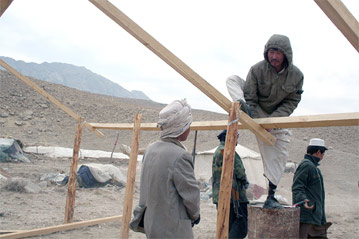Pakistan earthquake: Coping with winter, planning for recovery
Pakistan earthquake: Coping with winter, planning for recovery
The winter cold has hit northern Pakistan's quake zone. The mountain villages are now minus 10 degrees Celsius at night - Batagram is down to minus 4, while Muzaffarabad is hovering around freezing point. With 107 staff members and 39 mobile teams on the ground, UNHCR is boosting its winterization campaign with a new round of aid distribution in camps for quake survivors.
A total of 250,000 blankets and 77,000 plastic sheets are being distributed this week in camps in North West Frontier Province and Pakistan-administered Kashmir. These are in addition to the 19,439 tents, 431,184 blankets, 60,413 plastic sheets, 15,886 mattresses, 24,908 jerry cans and 20,008 kitchen sets we distributed earlier in the relief effort. We hope that these new supplies will enable people in camps to have the full package of winterized items - three blankets per person; four mattresses and two plastic sheets per tent.
Despite these efforts, people will inevitably try to stay warm with candles and stoves in their tents, increasing the risk of tent fires. We're working with the authorities to find safe ways to provide heating in camps, whether it's mud fireplaces made by Afghan refugees or steel casings for the stoves to contain the flame. The army is also exploring the options of heated platforms and even hot water bottles. Meanwhile, our camp management mobile teams are spreading the message of fire safety in camps.
Another concern is that more people from the upper valleys may come down as temperatures dip. We're working with the government to expand existing sites like Meira (total capacity: 40,000) and Havelian (120 new arrivals daily) camps, and building new ones like Bakrial and Haripur to accommodate up to 50,000 more arrivals.
As the lead agency for camp management, we're currently supporting the authorities and NGOs in 37 planned camps with 57,742 people. We've also counted 335 spontaneous camps with 126,718 people.
Living conditions in spontaneous camps are an ongoing concern. Our technical mobile teams have been fixing latrines, bathrooms and communal kitchens in 50 of these camps so far. We're also working with partners like Unicef and Oxfam to provide water. Decongestion of overcrowded camps is continuing. We've identified several sites in the Neelum Valley that could house a few hundred families from overcrowded spontaneous camps. Discussions are underway with the landowners on lease arrangements.
Visiting spontaneous camps in NWFP, our mobile teams have found many women with various health problems. Women doctors are urgently needed. We contacted Cuban doctors based at Bassian camp, and they're now making regular visits to Balakot and the Siran Valley. Two overworked Afghan doctors in Balakot's Dosti camp are also receiving support from a team from the NGO, International Medical Corps.
Capacity-building has started in some of the planned camps. Three camps in Balakot - Bassian, Ghari Habibullah and Ghazikot - now have vocational training (sewing) for women. UNHCR is also training our partners in NGOs like Intersos, THW, Best and IDSP on site planning, community mobilization, protection and identification of vulnerable groups.
As the year draws to a close, our plan for next year is to focus on capacity-building and registration while continuing to provide assistance and coordinate services in camps. After this emergency phase, our priority will be to empower the Pakistan authorities, local NGOs and quake survivors themselves in order to facilitate the process of return and rehabilitation once winter ends.








